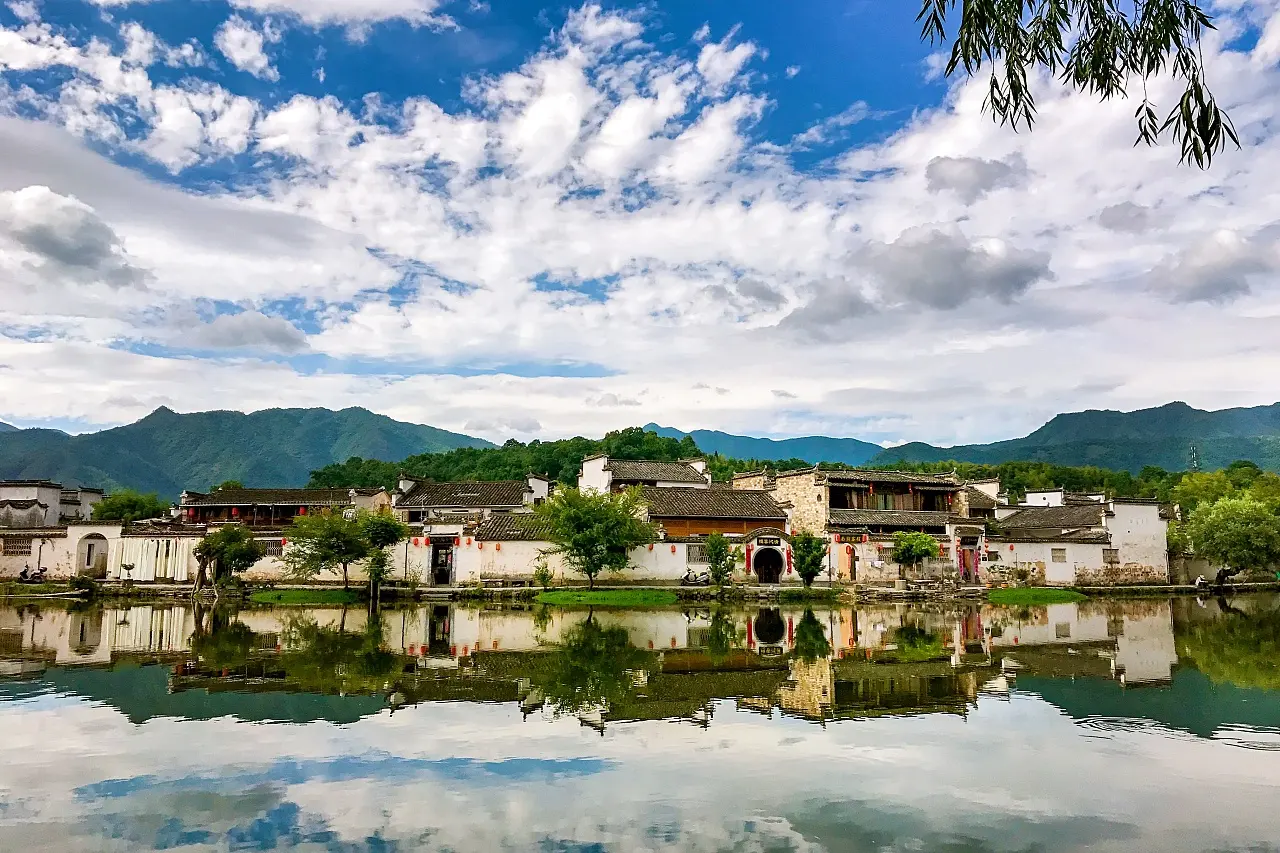Overview
Chinese Name: 皖南古村落
English Name: The Ancient Villages in Southern Anhui;Xidi and Hongcun
Location: Anhui
Type: Ancient culture and art
Rating Level: AAAAA (5A)

Brief Introduction
The Ancient Villages in Southern Anhui are located in the east of Yi County, Anhui Province, represented by Xidi Village西递 and Hong Village宏村. Xidi and Hongcun ancient residential villages are located in Huangshan黄山 scenic spot in Yi County, Anhui Province, Eastern China.
Xidi village covers an area of nearly 13 hectares and has a history of more than 950 years. It now has 3 ancestral halls, 1 archway, and 224 ancient folk houses from the 14th century to the 19th century. The Ancient Villages in Southern Anhui have well preserved the typical ancient village style of the Ming and Qing Dynasties, known as the “living ancient folk house museum”. The Ancient Villages in Southern Anhui were founded in 1131 A.D., and now there are 137 ancient buildings from Ming and Qing Dynasties.

The Ancient Villages in Southern Anhui are typical representatives of the late feudal culture of China – the carrier of Huizhou culture, which embodies the characteristics of Huizhou Folk Houses with exquisite craftsmanship.

The Ancient Villages in Southern Anhui are listed on the world cultural heritage list by UNESCO in 2001. In 2001, ancient villages in southern Anhui became one of the fifth batches of national key cultural relics protection units. The Ancient Villages in Southern Anhui were rated as national 5A tourist attractions in 2011.
What are worth visiting and seeing?
South Lake南湖 is located at the south head of Hongcun village, built in Wanli万历 of the Ming Dynasty. From Yongle永乐 to Wanli years, Hongcun village has many buildings, scattered in height, and the population has multiplied. It is not enough to rely on the moon pond to store water alone. At the end of the Wanli year, 100 mus of fertile farmland in the south of the village was dug several feet deep, surrounded by stones and shores, imitating the autumn moon style of West Lake Pinghu, and the South Lake was built.
The lake is in a large bow shape. The lake embankment is divided into upper and lower layers, and the upper layer is 4 meters wide. The South Lake has been overhauled three times in history. In 1986, the middle embankment was rebuilt, and the “Painted Bridge漆桥” was built to row boats from east to west.

In the autumn of the fifth year of Jiaqing in the Qing Dynasty, after visiting the South Lake, Wu Xi吴锡, a famous scholar in Qiantang钱塘 (now Hangzhou杭州), Zhejiang Province, wrote: “the South Lake in Hongcun is comparable to the West Lake in Zhejiang Province”, so the South Lake is also known as “the small West Lake at the foot of Huangshan”. Many ancient and modern poets and painters have made many poems and paintings after visiting South Lake.

Red and white ancient trees红白古树, located at the entrance of Hongcun village, are two 500-year-old trees. One is called Gufeng poplar古风杨, which is locally called red poplar红杨; One is called ginkgo tree银杏树, which is locally called white fruit tree白果树.
The red poplar on the north side is 19 meters high and 6 meters around. It takes 4 or 5 people to hug it. The crown is shaped like a giant umbrella, covering several acres of land at the entrance of the village in the shade.
The white fruit tree on the south side is 20 meters high, shaped like a sword, and stabs into the sky. Because ginkgo is a rare tree species in the world, and this ginkgo is 500 years old, so everyone calls this ginkgo “treasure” at the entrance of the village. These two big trees are the “horn” of the ox-shaped village and the “geomantic tree风水树” of Hongcun, which are also a symbol of good luck.

Xidi is a village in Xidi Town, Southeast of Yi County in southern Anhui Province. The Ancient Villages in Southern Anhui were originally called “Xichuan西川” because the river flowed westward through the village during the Song Dynasty, which was founded in the 11th century A.D.

In Xidi Village, the main road runs through the East and West, and passes through many narrow alleys with a parallel Street on both sides, forming a village street mainly in the East and extending to the north and south. Most of the streets in the village are set up along the stream, all of which are paved with bluestone. The ancient dwellings preserved today retain the basic features and characteristics of Huizhou residential villages in the lower Ming and Qing Dynasties as a whole, mainly including 124 ancient dwellings, 3 ancestral halls, and other well-protected ancient buildings in Ming and Qing Dynasties. Most of the dwellings are open to the public.

A major feature of Hongcun is that it has a perfect water supply system. The Ancient Villages in Southern Anhui villagers introduced the river water in the west of the village into the village and dug a nearly 1-meter wide water tunnel with nine bends and ten bends to provide domestic water for all households. At the same time, it also played a role in regulating the temperature and beautifying the environment. The water channel forms a half-moon-shaped moon marsh in the middle of the village, and an arched South Lake in the south, forming the unique style of Hongcun.
